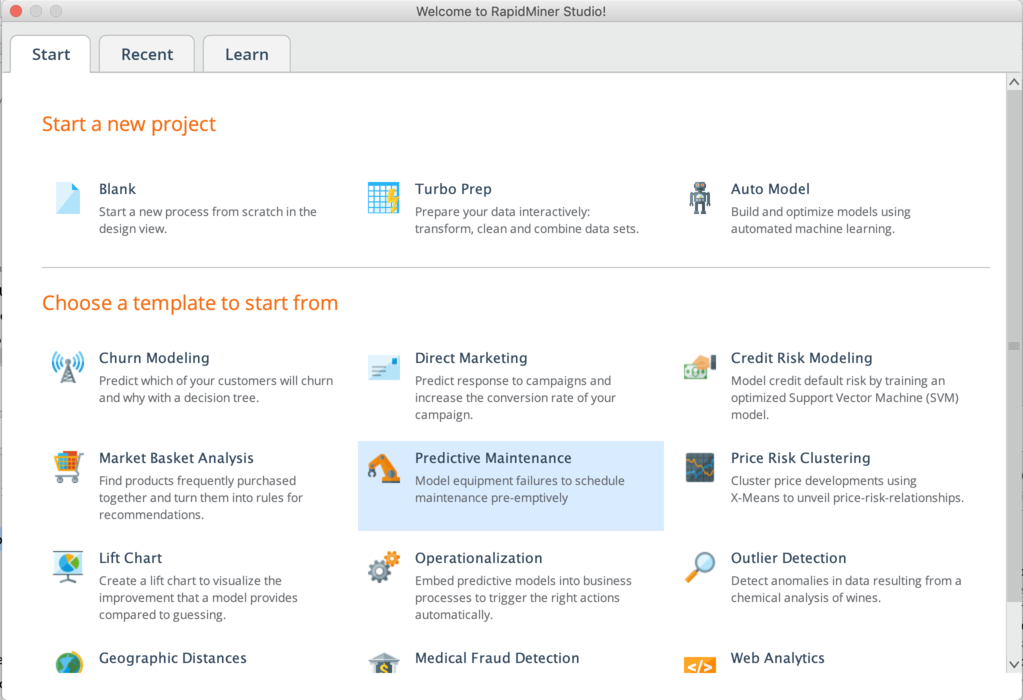
- #RAPIDMINER STUDIO TUTORIAL HOW TO#
- #RAPIDMINER STUDIO TUTORIAL INSTALL#
- #RAPIDMINER STUDIO TUTORIAL FULL#
- #RAPIDMINER STUDIO TUTORIAL SOFTWARE#
- #RAPIDMINER STUDIO TUTORIAL TRIAL#
We will need to ensure all the text strings are encoded into numbers so the engine we use can ingest it. We need to extract and process the dataset in such a way where it is structured with fields that we may need as ‘features’ which is just to be inclusive in the AI model we create.It’s important for newcomers to any data science discipline to know that the majority of your time spent will be in data pre-processing and analyzing what you have which includes cleaning up the data, normalizing, extracting any additional meta insights, and then encoding the data so that it is ready for an AI solution to ingest it.
#RAPIDMINER STUDIO TUTORIAL INSTALL#
Required: Install python packages: (numpy, pandas, tensorflow, sklearn via “pip install ” from the command line.Required: Python environment, use the Python 3.8.3 圆4 bit release.
#RAPIDMINER STUDIO TUTORIAL TRIAL#
#RAPIDMINER STUDIO TUTORIAL FULL#

Pre-process the data provided from US-CERT into an AI solution ready format (Tensorflow in particular).What many tutorials don’t state is that if you’re starting from scratch data pre-processing takes up to 90% of your time when doing projects like these.Īt the end of this hybrid article and tutorial, you should be able to: Stay with me and try not to fall asleep during the data pre-processing portion. Note: To use and replicate the pre-processed data and steps we use, prepare to spend 1–2 hours on this page. Throughout the article, I will also point out the applicability and return on investment depending on your existing Information Security program in the enterprise. We will ultimately create models that can be re-used for additional predictions based on security events. We will start our journey with the raw data provided by the dataset and provide examples of different pre-processing methods to get it “ready” for the AI solution to ingest. The methods and solutions are designed for non-domain experts particularly cyber security professionals.

#RAPIDMINER STUDIO TUTORIAL HOW TO#
This technical article will teach you how to pre-process data, create your own neural networks, and train and evaluate models using the US-CERT’s simulated insider threat dataset. This allows the reader maximum flexibility for their hands-on data mining experience.An A-Z tutorial of using US-CERT insider threat data in neural network creation and modeling in tensorflow and rapidminer studio for cybersec professionals.
#RAPIDMINER STUDIO TUTORIAL SOFTWARE#
Both software tools are used for stepping students through the tutorials depicting the knowledge discovery process. The text provides in-depth coverage of RapidMiner Studio and Weka’s Explorer interface. The second edition contains tutorials for attribute selection, dealing with imbalanced data, outlier analysis, time series analysis, mining textual data, and more. Several new topics have been added to the second edition including an introduction to Big Data and data analytics, ROC curves, Pareto lift charts, methods for handling large-sized, streaming and imbalanced data, support vector machines, and extended coverage of textual data mining.

Fundamental data mining strategies, techniques, and evaluation methods are presented and implemented with the help of two well-known software tools. The text guides students to understand how data mining can be employed to solve real problems and recognize whether a data mining solution is a feasible alternative for a specific problem. Data Mining: A Tutorial-Based Primer, Second Edition provides a comprehensive introduction to data mining with a focus on model building and testing, as well as on interpreting and validating results.


 0 kommentar(er)
0 kommentar(er)
